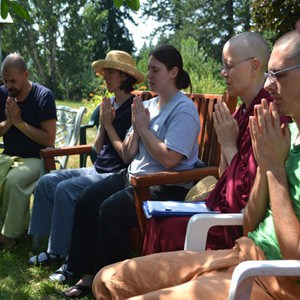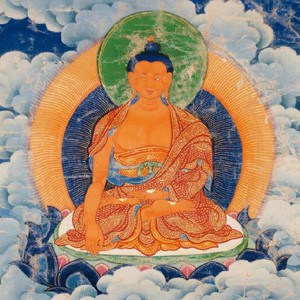Questions for group discussions

A talk given during Sravasti Abbey's annual Exploring Monastic Life program in 2007.
We have found that meditating on various topics and then discussing helps us to clarify our own thoughts, learn from others, and develop Dharma friendships. Here are some of the topics we discussed. You may want to spend some time contemplating them and discussing them with others.
Buddhism and reasons for attending Exploring Monastic Life
- What attracted you to Buddhism?
- What draws you to and interests you in monastic life?
- What would you like to give to the group during this program?
Not getting what we want
- How do you feel and act when you don’t get the material objects, such as food, one’s room, or money that you want?
- How do you feel and act when people don’t treat you as you want to be treated?
- How do you feel and act when you feel the need for more “space” but can’t get it?
- How do you feel and act when you want appreciation, approval, or emotional support from others, but don’t get it?
Authority figures
- Do a review of relationships in your life with authority figures. What patterns do you notice in how you feel about authority figures and how you relate to them?
- What is the difference in relationships with authority figures between those we choose (e.g. a spiritual mentor) and those we get by circumstance (e.g. a parent)
- How do you relate to rules and structure? Think of this is terms of school, work, precepts.
- What is the difference between rules and guidelines for training?
Lying
- Review your life in terms of telling lies. Note the “big” lies: whom we lie to, what we lie about. Do you notice any patterns?
- In what ways do you have concealment—someone with good intentions points out a fault and you deny it?
- In what ways do you have pretension—pretending to have good qualities when you don’t
- In what ways do you have dissimulation—hiding your negative qualities.
- What feeds concealment, pretension, and dissimulation in your life? What lies behind these three?
Comparing yourself to others
- Whom do you compare yourself with? In what ways do you compare yourself; money, status, knowledge? How do you rank?
- How does that make you feel about yourself?
- How does it make you act in relation to others? How do you behave?
- What ideas do you have for reversing this trend?
Anxiety
- What is your definition of anxiety? How do you know when you’re anxious?
- What kinds of people or situations make you anxious?
- How do you express your anxiety? How does it affect your speech? How do you behave?
- What ideas do you have to handle your anxiety?
Good qualities
- What are your good qualities? List five
- How did you cultivate these qualities? Did certain people encourage you to develop them or model these qualities?
- What are some good qualities you would like to develop in the future (state them positively)?
- How will you go about developing those qualities?
Friendship
- What qualities do your look for in choosing friends? What attracts you to them?
- How have your friends influenced you both positively and adversely?
- How have your friendships changed over time?
- What are difficult aspects that you experience in friendships?
- How can you be a better friend to others?
Intoxicants
- Do a life review of your use of intoxicants—alcohol, tobacco and recreational drugs. What was the motivation for using any of these?
- What is the effect on self and others?
- How did drinking and/or drugging help you to create an identity?
- What made you stop?
- What other behaviors are addictive or destructive to yourself?
Monastic life
- How do you anticipate the reaction of family members if you ordain?
- Would any of their reactions push your buttons? Which ones?
- What ideas do you have for dealing with your buttons in a constructive way?
- How could you allay the fears and concerns of your family and friends?
- How will you feel being in public with possible comments from others (e.g., on wearing robes and having a shaven head)?
- What questions or concerns do you have about your changed role in the family and in society?
Career
- What does it mean to you to have a career? How does your career fit into your identity or create an identity?
- What are the advantages of having a career? What are disadvantages?
- How do you feel about having a career?
- How do you feel about giving up a career to be a monastic? How would that affect your identity, your feeling of being an independent person, etc.
Life
- You are the same person but imagine that all external circumstance are whatever you want them to be—you have a perfect samsaric life.
- At age 90 when your about to die, how do you feel? What karmic seeds and habitual patterns are there on your mindstream?
- Imagine you ordained and lived as a monastic.
- At age 90 when you are about to die, how do you feel? What karmic seeds and habitual patterns are there on your mindstream?
Venerable Thubten Chodron
Venerable Chodron emphasizes the practical application of Buddha’s teachings in our daily lives and is especially skilled at explaining them in ways easily understood and practiced by Westerners. She is well known for her warm, humorous, and lucid teachings. She was ordained as a Buddhist nun in 1977 by Kyabje Ling Rinpoche in Dharamsala, India, and in 1986 she received bhikshuni (full) ordination in Taiwan. Read her full bio.


